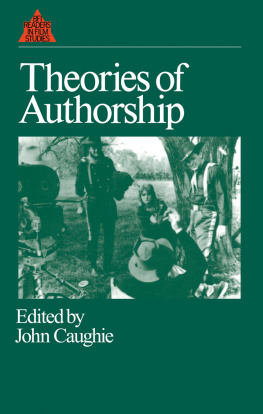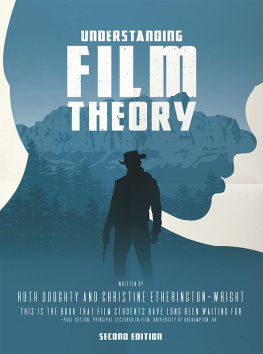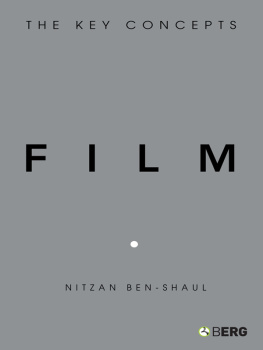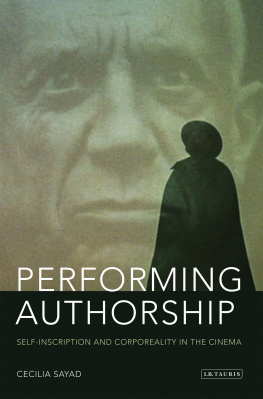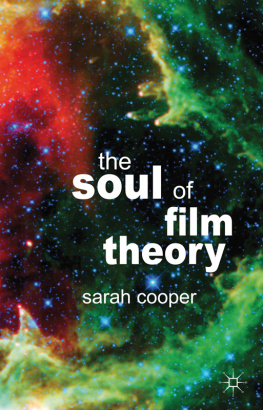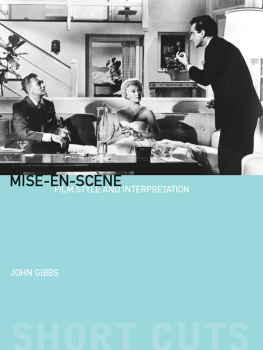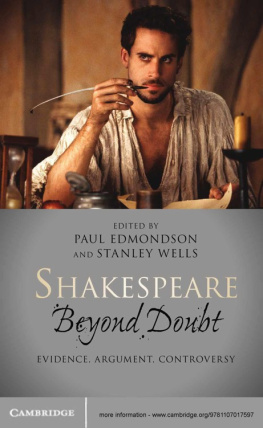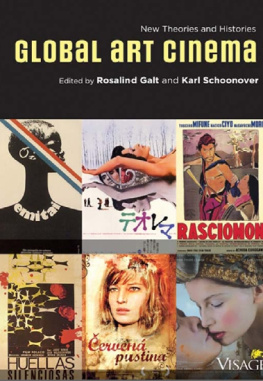John Caughie - Theories of Authorship
Here you can read online John Caughie - Theories of Authorship full text of the book (entire story) in english for free. Download pdf and epub, get meaning, cover and reviews about this ebook. year: 1981, publisher: Routledge, genre: Art. Description of the work, (preface) as well as reviews are available. Best literature library LitArk.com created for fans of good reading and offers a wide selection of genres:
Romance novel
Science fiction
Adventure
Detective
Science
History
Home and family
Prose
Art
Politics
Computer
Non-fiction
Religion
Business
Children
Humor
Choose a favorite category and find really read worthwhile books. Enjoy immersion in the world of imagination, feel the emotions of the characters or learn something new for yourself, make an fascinating discovery.
- Book:Theories of Authorship
- Author:
- Publisher:Routledge
- Genre:
- Year:1981
- Rating:5 / 5
- Favourites:Add to favourites
- Your mark:
- 100
- 1
- 2
- 3
- 4
- 5
Theories of Authorship: summary, description and annotation
We offer to read an annotation, description, summary or preface (depends on what the author of the book "Theories of Authorship" wrote himself). If you haven't found the necessary information about the book — write in the comments, we will try to find it.
Theories of Authorship — read online for free the complete book (whole text) full work
Below is the text of the book, divided by pages. System saving the place of the last page read, allows you to conveniently read the book "Theories of Authorship" online for free, without having to search again every time where you left off. Put a bookmark, and you can go to the page where you finished reading at any time.
Font size:
Interval:
Bookmark:

Theories of Authorship: A Reader
The figure of the author has been central in film theory and criticism over the past thirty years. John Caughie documents the major stages in the debate about film authorship, and introduces recent writing on film to suggest important ways in which the debate might be reconsidered.
Since the fifties, much of the significant critical writing on cinema has developed within a conception of art which sees the auteur as a creative and self-expressive figure; more recently, theories of subjectivity and textuality have disturbed this view by throwing into question the centrality of the author in the text. Theories of Authorship points to the continuing importance of the issues which are at stake. By tracing certain continuities of concern, most notably the various ways in which John Ford is discussed, the collection of essays and extracts provides points of orientation and focus within the debate; and, by introducing writing from outside the literature of film (Barthes, Macherey, and Foucault for example) and from outside the traditional grounds on which the debate has been staged, it proposes a wider theoretical field in which the question of authorship can be rethought.
John Caughies editorial commentary examines the contributions to the debate and guides the reader towards a new perspective on authorship and film theory.
The Editor
John Caughie was born and educated in Scotland, and graduated from the University of Glasgow in 1966 with a degree in English. He is now Lecturer in Film and Television Studies at the University of Glasgow, and Director of the John Logie Baird Centre for Research in Film and Television.
Front cover photo: John Ford directing The Horse Soldiers
British Film Institute Readers in Film Studies
Theories of Authorship:
A Reader/Edited by John Caughie

First published in 1981
by Routledge & Kegan Paul Ltd
Reprinted 1986, 1988, 1990, 1993, 1995, 1996,
1999 (twice), 2001
by Routledge
2 Park Square, Milton Park, Abingdon, Oxon, OX14 4RN
270 Madison Ave, New York NY 10016
Set in Linotron Sabon and Helvetica by
Input Typesetting Ltd,
London, SW19
Transferred to Digital Printing 2005
Routledge is an imprint of the Taylor & Francis Group
Introduction and editorial matter:
British Film Institute 1981
All rights reserved. No part of this book may be reprinted or reproduced or utilized in any form or by any electronic, mechanical, or other means, now known or hereafter invented, including photocopying and recording, or in any information storage or retrieval system, without permission in writing from the publishers.
British Library Cataloguing in Publication Data
Caughie, John
Theories of authorship. (British Film Institute. Readers in film studies).
1. Moving-pictures Production and direction
I. Title II. Series
791.43'0233 PN1995.9.P7 80-41575
ISBN 0415025524
Contents
)
The publishers wish to thank the following for permission to reprint the copyright material listed below:
Oxford University Press for The Mirror and the Lamp: Romantic Theory and the Critical Tradition by M. H. Abrams. Copyright 1953 by Oxford University Press, Inc. Reprinted by permission; the author and Screen for Edward Buscombe, Ideas of Authorship, Screen, vol. 14, no. 3, Autumn 1973, pp. 7585, copyright Screen 1973; Cahiers du Cinma for Pierre Kast, Des confitures pour un gendarme, Cahiers du Cinma no. 2, May 1951, p. 40, Eric Rohmer, Renoir Amricain, Cahiers du Cinma no. 8, Jan. 1952, pp. 345, Franois Truffaut, Une certaine tendance du cinma franais, Cahiers du Cinma no. 31, Jan. 1954, pp. 267, Eric Rohmer, A qui la faute?, Cahiers du Cinma no. 39, Oct. 1954, pp. 67, Jacques Rivette, Notes sur une rvolution, Cahiers du Cinma no. 54, Christmas 1955, pp. 1819, Fereydoun Hoveyda, La rponse de Nicholas Ray, Cahiers du Cinma no. 107, May 1960, pp. 1323, Luc Moullet, Sam Fuller: sur les brises de Marlowe, Cahiers du Cinma no. 93, March 1959, pp. 1114, Andr Bazin, Comment peut-on tre Hitchcocko-Hawksien?, Cahiers du Cinma no. 44, Feb. 1955, p. 18, Andr Bazin, De la politique des auteurs, Cahiers du Cinma no. 70, April 1957, pp. 911 (translation by Peter Graham in The New Wave, Secker & Warburg, 1968, reprinted by permission), Fereydoun Hoveyda, Autocritique, Cahiers du Cinma no. 126, Dec. 1961, p. 45, Louis Marcorelles, Ford of the Movies, Cahiers du Cinma no. 86, Aug. 1958, pp. 327, Jean-Louis Comolli, Signes de piste, Cahiers du Cinma no. 164, March 1965, pp. 756, Jean Narboni, La preuve par huit, Cahiers du Cinma no. 182, Sept. 1966, pp. 204, Jean-Pierre Oudart, Conclusion to John Fords Young Mr Lincoln, Cahiers du Cinma no. 223, Aug. 1970, (translation by Helen Lackner and Diana Matias in Screen vol. 13, no. 3, Autumn 1972, pp. 3944, copyright Screen 1972), Jean-Pierre Oudart, Le hors-champ de lAuteur, Cahiers du Cinma nos. 2367, MarchApril 1971, pp. 869 all material from Cahiers du Cinma copyright les Editions de lEtoile; English translations, except where stated, by Norman King, copyright British Film Institute 1980; Movie for Ian Cameron, Films, Directors and Critics, Movie no. 2, Sept. 1962, pp. 46, Ian Cameron, Jim Hillier, V. F. Perkins, Michael Walker, The Return of Movie: a discussion, Movie no. 20, Edinburgh Film Festival 1976); the author for Geoffrey Nowell-Smith, A note on History/Discourse, Edinburgh 76 Magazine, Edinburgh Film Festival, 1976; the author and Cine-Tracts for Sandy Flitterman, Woman, Desire and the Look: Feminism and the Enunciative Apparatus in Cinema, Cine-Tracts 5, vol. 2, no. 1, Fall 1978, pp. 638; the author for Nick Browne, The Rhetoric of the Specular Text with reference to Stagecoach (originally published in French in Communications no. 23. An expanded version published as The Spectator-in-the-Text: The Rhetoric of Stagecoach, Film Quarterly, vol. 29, no. 2, Winter 19756, pp. 2638); the author and the British Film Institute for Pam Cook, The Point of Self-Expression in Avant-garde Film, Catalogue of BFI Productions 19778, BFI, 1978; the author, Basil Blackwell and La Socit Franaise de Philosophie for Michel Foucault, What is an Author, from Language, Counter-Memory, Practice, Basil Blackwell, Oxford, 1977, pp. 12138 (originally published in Bulletin de la Socit Franaise de Philosophie vol. 63, no. 3, 1969).
Stills from Stagecoach by courtesy of United Artists and from Marnie by courtesy of Universal. The stills on the cover and jacket from The Horse Soldiers by courtesy of Universal.
Author and criticism have developed together over the last hundred and fifty odd years until the achieved situation of today when the institutionalization of literary criticism (in faculties, journals, newspaper reviews, etc.) in replacement of the discipline of rhetoric (founded not on the author but on the orders of discourse) depends on and sustains the author (enshrined in syllabi and examinations, interviews and television portraits). The task of criticism has been precisely the construction of the author. It must read the author in the texts grouped under his name. Style in this perspective is the result of the extraction of marks of individuality, a creation of the author and the area of his value. Criticism, in short, is the modern hermeneutics; the passage from God to Author.
Next pageFont size:
Interval:
Bookmark:
Similar books «Theories of Authorship»
Look at similar books to Theories of Authorship. We have selected literature similar in name and meaning in the hope of providing readers with more options to find new, interesting, not yet read works.
Discussion, reviews of the book Theories of Authorship and just readers' own opinions. Leave your comments, write what you think about the work, its meaning or the main characters. Specify what exactly you liked and what you didn't like, and why you think so.

